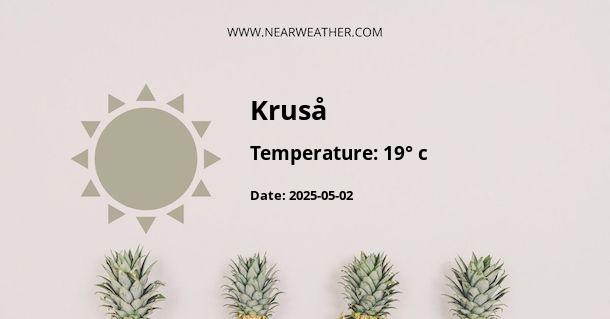Krusa, Denmark: Climate and Weather Year Round
Krusa is a charming village located in Denmark, known for its picturesque landscapes and rich cultural heritage. Understanding the climate and weather patterns of Krusa is essential for both residents and tourists planning a visit to this beautiful destination. In this article, we will explore the climate of Krusa throughout the year, including temperature ranges, precipitation levels, and other important weather factors.
Temperature
Krusa experiences a temperate maritime climate, characterized by mild summers and cool winters. The average annual temperature in Krusa hovers around 9 degrees Celsius (48 degrees Fahrenheit). However, it is important to note that temperatures can vary significantly throughout the year.
During the summer months of June, July, and August, Krusa enjoys relatively warm temperatures, with averages ranging from 15 to 20 degrees Celsius (59 to 68 degrees Fahrenheit). These months are considered the peak tourist season, as visitors flock to Krusa to enjoy its pleasant weather and outdoor activities.
Winter in Krusa, on the other hand, can be quite chilly. The months of December, January, and February are the coldest, with average temperatures ranging from 0 to 4 degrees Celsius (32 to 39 degrees Fahrenheit). It is not uncommon for Krusa to experience snowfall during these months, creating a magical winter wonderland.
Precipitation
Precipitation levels in Krusa are fairly evenly distributed throughout the year. The village receives an average of around 700 to 800 millimeters (27 to 31 inches) of rainfall annually. Rainfall is spread over approximately 120 to 130 days each year, with the wettest months typically being July and August.
While rain is common throughout the year, the summer months tend to have slightly higher precipitation levels compared to the rest of the year. It is advisable for visitors to pack appropriate rain gear when visiting Krusa during this time, to ensure they can fully enjoy their outdoor activities despite the occasional showers.
Sunshine Hours
Krusa receives a moderate amount of sunshine throughout the year, with approximately 1,600 to 1,800 hours of sunshine annually. The summer months tend to have longer daylight hours, allowing visitors to make the most of their time outdoors.
On average, Krusa experiences around 6 to 7 hours of sunshine per day during the summer months, while the winter months see a decrease to approximately 2 to 3 hours per day. It is important to note that daylight hours can vary significantly depending on the time of year, with shorter days during winter and longer days during summer.
Wind
Being located near the coast, Krusa experiences moderate to strong winds throughout the year. The prevailing winds in the area are usually from the west, bringing in fresh sea breezes. These winds can make the weather feel cooler, especially during the winter months.
It is important for visitors to be prepared for windy conditions when visiting Krusa, and to dress accordingly to stay comfortable and protected from the wind-chill factor.
Best Time to Visit Krusa
The best time to visit Krusa largely depends on personal preferences and the desired activities. The summer months of June, July, and August offer the warmest temperatures and longer daylight hours, making them ideal for outdoor activities such as hiking, cycling, and exploring the natural beauty of the region.
For those who enjoy winter sports and the magical ambiance of a snowy landscape, the winter months of December, January, and February are the best time to visit Krusa. The village transforms into a winter wonderland, offering opportunities for skiing, snowboarding, and other winter activities.
It is important to note that Krusa can be quite popular with tourists during the peak summer season, so visitors may prefer to plan their visit during the shoulder seasons of spring (March to May) or autumn (September to November) for a quieter and more serene experience.
Conclusion
Krusa, Denmark, experiences a temperate maritime climate with mild summers and cool winters. The average annual temperature hovers around 9 degrees Celsius (48 degrees Fahrenheit). The village receives approximately 700 to 800 millimeters (27 to 31 inches) of rainfall annually, spread over 120 to 130 days. Krusa enjoys a moderate amount of sunshine, with around 1,600 to 1,800 hours of sunshine per year. Visitors should be prepared for moderate to strong winds, especially during the winter months. The best time to visit Krusa depends on personal preferences, with summer offering warm temperatures and longer days, and winter providing a winter wonderland for winter sports enthusiasts.
A - Kruså's Latitude is 54.850971 & Longitude is 9.401290.
A - Weather in Kruså is 1° today.
A - Climate Conditions in Kruså shows broken clouds today.
A - Humidity in Kruså is 94% today.
A - Wind speed in Kruså is 27.79 km/h, flowing at 200° wind direction. today.
